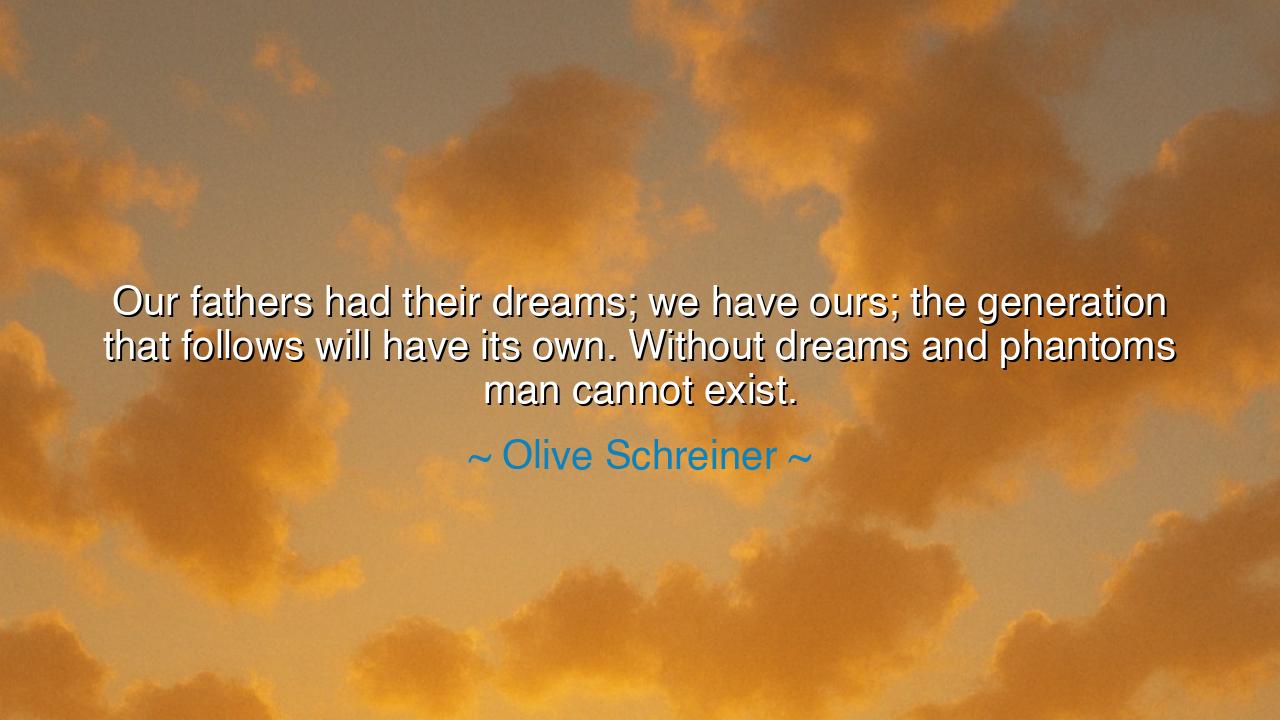
Our fathers had their dreams; we have ours; the generation that
Our fathers had their dreams; we have ours; the generation that follows will have its own. Without dreams and phantoms man cannot exist.






“Our fathers had their dreams; we have ours; the generation that follows will have its own. Without dreams and phantoms man cannot exist.” So wrote Olive Schreiner, the South African novelist and philosopher whose pen burned with the fire of human longing and idealism. In these luminous words, she speaks not only of time and change, but of the sacred continuity of the human spirit — the eternal chain of dreams that binds one generation to the next. To Schreiner, the dream is not a mere fancy of the mind; it is the essence of existence, the invisible breath that keeps humanity alive through ages of struggle, doubt, and transformation.
Her words arose in a time of awakening. Schreiner lived during the late nineteenth century, an age of empire and upheaval, when women and colonized peoples began to raise their voices against centuries of silence. As a writer and reformer, she saw the dream as both rebellion and renewal — the power that allows the soul to transcend its chains. Her own dream was of justice, equality, and spiritual freedom, but she knew that no generation could claim monopoly over vision. Each age must dream anew, for the world shifts as the stars do, and the hopes of one era must give birth to the next. Thus, her quote is both an ode to the past and a call to the future: honor the dreams of your fathers, yes, but have the courage to forge your own.
To live without dreams, Schreiner warns, is to cease truly living. The dream is what animates the clay of man; it gives direction to his hands and purpose to his heart. Empires may crumble, sciences may evolve, and traditions may fade, but the phantom — that shining ideal we chase through the corridors of time — remains the force that propels us forward. Without it, civilization stagnates. Every great work of art, every act of heroism, every invention that has lifted humanity from darkness began first as a dream, fragile and unseen, carried within a single heart.
History bears witness to this truth. Consider the story of Mahatma Gandhi, who walked a colonized land barefoot and dreamed of freedom through peace. His contemporaries mocked his vision as naïve, even impossible, yet his dream outlived the empires that oppressed it. Or think of Marie Curie, who dared to imagine a world illuminated by invisible forces, when many still thought the mysteries of nature were closed to women. Their fathers had dreams of their own — different, yet no less noble — and in each generation, humanity advanced not by imitation, but by renewal. Thus, Schreiner’s words remind us that every dreamer stands upon the shoulders of those before them, yet must also look beyond the horizon they could not reach.
There is something deeply sacred in this rhythm of dreaming. It is as if humanity itself breathes through its aspirations — inhaling the wisdom of the past, exhaling the visions of the future. Our fathers dreamed of survival; we dream of purpose; our children will dream of harmony beyond what we can now conceive. The phantoms Schreiner speaks of — those grand, unfulfilled ideals — are not illusions to be despised, but guiding spirits that call us ever forward. They are the light we follow, knowing we may never reach it, yet finding meaning in the journey itself.
Yet we must not mistake dreaming for idleness. To dream is not to escape reality, but to reshape it. The dreamer’s duty is to give substance to the unseen — to build bridges between vision and action. For what good is a dream unspoken, or a hope untried? The farmer who imagines a harvest must still sow his seed; the poet who envisions beauty must still endure the struggle of words. True dreams demand both courage and labor, for they are the offspring of faith and discipline combined. Schreiner’s wisdom is thus a challenge: dare to dream, but dare also to act upon it.
So, dear listener, let these words awaken something ancient within you: keep dreaming. Do not be shamed by those who call your visions foolish, for all progress once seemed folly. Listen to the whispers of your forebears, who dreamed before you, and carry their spirit onward. But also listen to your own heart, for it speaks the language of your time. Pass on to your children not merely your possessions, but your capacity to dream — for this is the greatest inheritance of all.
In the end, remember Schreiner’s truth: “Without dreams and phantoms man cannot exist.” For the dream is the flame that lights the darkness; it is the silent promise that tomorrow may be better than today. Nurture it, protect it, and let it grow — for though you may not live to see its fulfillment, the generations that follow will walk in the light you dared to imagine. Thus, through your dreaming, you will have touched eternity.






AAdministratorAdministrator
Welcome, honored guests. Please leave a comment, we will respond soon